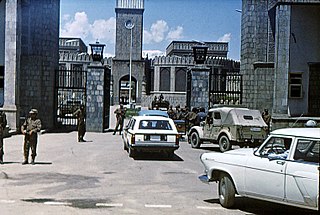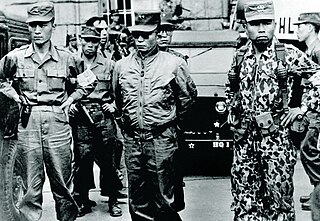
The bell pepper is the fruit of plants in the Grossum cultivar group of the species Capsicum annuum. Cultivars of the plant produce fruits in different colours, including red, yellow, orange, green, white, and purple. Bell peppers are sometimes grouped with less pungent pepper varieties as "sweet peppers". While they are fruits—botanically classified as berries—they are commonly used as a vegetable ingredient or side dish.

The Green Revolution, or Third Agricultural Revolution, is a set of research technology transfer initiatives occurring between 1950 and the late 1960s, that increased agricultural production worldwide, particularly in the developing world, beginning most markedly in the late 1960s. The initiatives resulted in the adoption of new technologies, including high-yielding varieties (HYVs) of cereals, especially dwarf wheats and rices. It was associated with chemical fertilizers, agro-chemicals, and controlled water-supply and newer methods of cultivation, including mechanization. All of these together were seen as a 'package of practices' to supersede 'traditional' technology and to be adopted as a whole.
Ku, KU, or Kū may refer to:
The abolition of monarchy involves the ending of monarchical elements in government, usually hereditary.

Thermidor was the eleventh month in the French Republican Calendar. The month was named after the French word thermal which comes from the Greek word "thermos" which means heat.

The Carnation Revolution, also known as the 25 April, was initially a 25 April 1974 military coup in Lisbon which overthrew the authoritarian Estado Novo regime. The revolution began as a coup organised by the Armed Forces Movement, composed of military officers who opposed the regime, but it was soon coupled with an unanticipated, popular civil resistance campaign. The revolution led to the fall of the Estado Novo, terminated the Portuguese Colonial War, and started a revolutionary process that would result in a democratic Portugal.

"The Revolution Will Not Be Televised" is a poem and song by Gil Scott-Heron. Scott-Heron first recorded it for his 1970 album Small Talk at 125th and Lenox, on which he recited the lyrics, accompanied by congas and bongo drums. A re-recorded version, with a full band, was the B-side to Scott-Heron's first single, "Home Is Where the Hatred Is", from his album Pieces of a Man (1971). It was also included on his compilation album, The Revolution Will Not Be Televised (1974). All these releases were issued on the Flying Dutchman Productions record label.

Juan Federico Ponce Vaides was the acting President of Guatemala from 4 July 1944 to 20 October 1944. He was overthrown by a popular uprising on the 20th of October 1944 that began the Guatemalan Revolution.

The Council of Five Hundred, or simply the Five Hundred, was the lower house of the legislature of France under the Constitution of the Year III. It existed during the period commonly known as the Directory (Directoire), from 26 October 1795 until 9 November 1799: roughly the second half of the period generally referred to as the French Revolution.

A nonviolent revolution is a revolution using mostly campaigns with civil resistance, including various forms of nonviolent protest, to bring about the departure of governments seen as entrenched and authoritarian. While many campaigns of civil resistance are intended for much more limited goals than revolution, generally a nonviolent revolution is characterized by simultaneous advocacy of democracy, human rights, and national independence in the country concerned. In some cases a campaign of civil resistance with a revolutionary purpose may be able to bring about the defeat of a dictatorial regime only if it obtains a degree of support from the armed forces, or at least their benevolent neutrality. Successful nonviolent revolution is an effective strategy to achieve practical goals by reinforcing nonviolent actions and changing social mentality toward nonviolence. Dictatorial regime is typically unable to reinforce nonviolent social dynamic, and is only limited to violence as means of control. Nonetheless, the human need for basic safety, shelter, and stability is often more powerful than a need for self-actualization. A nonviolent revolution is a product of self-actualization that requires highly motivated and organized individuals to seek change on the grounds of self-esteem, love, and acceptance.

The Second Republic of Korea was the government of South Korea from April 1960 to May 1961.

The Miracle on the Han River refers to the period of rapid economic growth in South Korea following the Korean War (1950–1953), during which South Korea transformed from a developing country to a developed country. The rapid reconstruction and development of the South Korean economy during the latter half of the 20th century was accompanied by events such as the country's successful hosting of the 1988 Summer Olympics and its co-hosting of the 2002 FIFA World Cup, as well as the ascension of family-owned conglomerates known as chaebols, such as Samsung, LG, and Hyundai.

The Processo Revolucionário Em Curso (PREC) was the period during the Portuguese transition to democracy, which started after a failed right-wing coup d'état on 11 March 1975, and ended after a failed left-wing coup d'état on 25 November 1975. This period was marked by political turmoil, violence, and instability, and the nationalization of industries.

The Saur Revolution, also romanized Sowr Revolution, and alternatively called the April Revolution or April Coup, was a coup d'état led by the Soviet-backed People's Democratic Party of Afghanistan (PDPA) against the rule of Afghan President Mohammed Daoud Khan on 27–28 April 1978. Daoud Khan and most of his family were killed at the presidential palace. The revolution resulted in the creation of a government with Nur Muhammad Taraki as President, and was the precursor to the 1979 intervention by the Soviets and the 1979–1989 Soviet–Afghan War against the Mujahideen.
The South Korean White Revolution is a term used to refer to the extensive use of plastic films for greenhouses, mulching and Polytunnels. This practice turned the color of the landscape from green to white, due to the large area of agricultural land under protected cultivation.

The Green Revolution in India refers to a period when Indian agriculture was converted into an industrial system due to the adoption of modern methods and technology such as the use of high yielding variety (HYV) seeds, tractors, irrigation facilities, pesticides, and fertilizers. It was mainly found by M.S. Swaminathan. This was part of the larger Green revolution endeavor initiated by Norman Borlaug, which leveraged agricultural research and technology to increase agricultural productivity in the developing world.

The May 16 military coup d'état was a military coup d'état in South Korea in 1961, organized and carried out by Park Chung-hee and his allies who formed the Military Revolutionary Committee, nominally led by Army Chief of Staff Chang Do-yong after the latter's acquiescence on the day of the coup. The coup rendered powerless the democratically elected government of Yun Bo-seon and ended the Second Republic, installing a reformist military Supreme Council for National Reconstruction effectively led by Park, who took over as Chairman after General Chang's arrest in July.

A communist revolution is a proletarian revolution often, but not necessarily, inspired by the ideas of Marxism that aims to replace capitalism with communism. Depending on the type of government, socialism can be used as an intermediate stage to Communism. The idea that a proletarian revolution is needed is a cornerstone of Marxism; Marxists believe that the workers of the world must unite and free themselves from capitalist oppression to create a world run by and for the working class. Thus, in the Marxist view, proletarian revolutions need to happen in countries all over the world.













